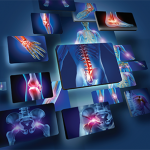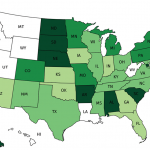The Rheumatology Research Foundation is pleased to announce the overwhelming success of the Journey to Cure campaign. With a goal of raising $60 million, this five-year campaign was created to directly invest in the future of rheumatology by supporting training opportunities and funding innovative research. The campaign surpassed its goal, with a grand total of…

The ACR’s Representation in American Medical Association Critical as Review Looms
There is a saying that if the American Medical Association (AMA) did not exist, we would have to invent it. That is just what Dr. Nathan S. Davis did back in 1845 when he called for a national medical convention and laid the foundation for the establishment of the AMA in 1847. This new group would…

The ACR Teams with National Bone Health Alliance to Increase Focus on Osteoporosis, Bone Disease
Bone health in general, and osteoporosis in particular, is among the most common conditions seen in rheumatology practices. The ACR recently joined the National Bone Health Alliance (NBHA) to reach out to other stakeholders. “In 2004, the Surgeon General of the United States published a report on osteoporosis that discussed in depth the gaps in…
The ACR Asks Congress to Dedicate Arthritis Research Funding to Help Military Service Members
In 2016, the ACR and the Arthritis Foundation teamed up to direct $20 million within the Department of Defense’s (DoD’s) Congressionally Directed Medical Research Program (CDMRP) to arthritis treatment and prevention. The CDMRP has millions of research dollars that have not been committed to specific items. In the new appropriations cycle, we are once again…

The ACR Supports Practicing Rheumatologists
A new presidential administration took office in January 2017. Although no one truly knows what directions our government and economy will take, one projection is that healthcare regulatory and insurance coverage policies will change, possibly dramatically. In a time of uncertainty, rheumatologists and rheumatology health professionals can turn to the ACR/ARHP for support, guidance and…

Former Senator Tim Hutchinson Urges ACR Members to Advocate for Rheumatology on Local, State and Federal Levels
WASHINGTON, D.C.—“Regardless of where we are on the political spectrum, we have to get engaged,” said Sen. Tim Hutchinson, senior director, Greenberg Traurig LLP, Washington, D.C., speaking at the 2016 ACR/ARHP Annual Meeting. As a former U.S. senator from Arkansas, Sen. Hutchinson talked about the importance of members in such organizations as the ACR to…

The ACR Government Affairs Committee’s Outgoing Chair Urges Members to Continue Advocating for Rheumatology
WASHINGTON, D.C.—Although political polarization in the U.S. has affected many people’s interest in participating in legislative and advocacy efforts that promote their concerns, William Harvey, MD, MSc, the ACR’s (immediate past) chair of the Government Affairs Committee, encouraged rheumatologists and ACR/ARHP members to remain engaged and get involved with the ACR to fight for issues…
The ACR Insurance Subcommittee Advocates for Fair Payer Policies
The ACR is committed to advocating for appropriate coverage and payment policies. The volunteer members of the Insurance Subcommittee (ISC) lead this effort by representing the ACR and its membership to the insurance industry. The ISC engages payers to ensure their policies are clinically appropriate and promote patient access to high-quality care and treatment. The…

RheumPAC Contributions Needed in 2017 to Educate Federal Policymakers about Rheumatology Concerns, Interests
2016 was an impactful year for ACR advocacy efforts. Last month we reviewed our advocacy accomplishments in 2016, accomplishments that benefited 100% of our members. However, more than 95% of ACR and ARHP members had not invested in RheumPAC by the conclusion of the 2016 ACR/ARHP Annual Meeting. Each year, many of the same dedicated…
Advocating Where It Counts: A Conversation with Incoming Government Affairs Committee Chair Angus Worthing, MD, FACR, FACP
As he prepares to take on his newest volunteer role with the ACR, leading the Government Affairs Committee (GAC), Angus Worthing, MD, FACR, FACP, is looking forward to making the most of the opportunities that a unified government can offer the ACR in advocating for rheumatology care. “Advocacy is an investment in our profession—regardless of…
- « Previous Page
- 1
- …
- 8
- 9
- 10
- 11
- 12
- …
- 29
- Next Page »